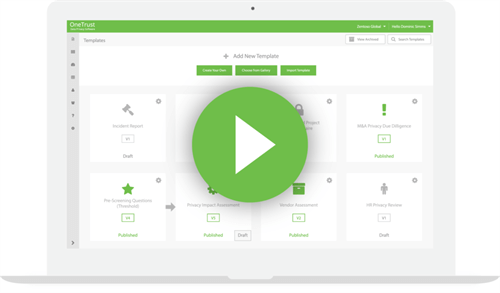Is Google Glass a Privacy Game Changer?
Google’s new wearable tech gadget has not yet been released, but it is already causing a wave of concern over its pervasive surveillance capabilities. Yet, in developing a new piece of consumer technology with a highly privacy intrusive feature set, might Google actually succeed in bringing the privacy debate into the consumer mainstream?
For those who don’t already know, Google Glass is a pair of glasses that come with a built in video camera, head-up display and internet connectivity. The gadget promises much for the wearer, like using augmented reality to overlay what you see with additional data about where you are, maps to help you navigate, facial recognition so you can spot your friends (or be reminded of the names of your business contacts). It will take photos and videos of what you are looking at, including audio. And of course it will upload all of this data to the web and enable you to share it through your social networks. It will also deliver to you location relevant search results, advertising and special offers.
Sounds pretty compelling doesn’t it? OK, it might look a little clunky right now, but that is a problem which is easily solved. Google is of course hoping that when it goes in sale, probably sometime this year, it will receive the kind of adulation that a new gizmo from Apple usually benefits from.
Now let’s look at it from another perspective. Somebody wearing Google Glass walks past you on the street and your image is captured and uploaded to Google’s servers. Facial recognition ties the image to your online profiles, and helps to link in to all the other data held about you. Suddenly Google, and maybe anyone else willing to pay them, has a new dimension of data about you. It wouldn’t take many people on the street wearing Glass to build up a profile of your movements in the real world.
Anyone who talks about the benefits of online tracking technology will tell you that an ad supported internet is what brings you all the great free online services you enjoy. Tracking your web history is good, because you get free content in return for seeing a few ads to products you may want to buy anyway.
Setting aside the problems with this argument, Glass breaks that model completely. Now you are being tracked in a completely new dimension, and getting no benefit at all. At least online by using the services, you are giving your tacit acceptance of being tracked. But with Glass, there is no additional benefit, just additional surveillance.
It is these features of Glass that have sparked off a big debate. Just try searching for ‘google glass privacy‘ to see a wealth of stories on tech and mainstream media sites all talking about the fear of that it could mean an end to privacy.
There is even a very active campaign site Stop the Cyborgs, which was set up in direct response to Glass.
One of the key concerns is that something like Glass doesn’t offer any real possibility of choice. At least when you are using your own device there are various opt-out controls and technologies you can add-on to protect your privacy. Glass enables you to be tracked by other people’s gadgets and there is no realistic way to protect yourself from that.
There have been a couple of proposals for ‘defence’ technologies which could stop Glass from tracking you. Yet the obvious question to ask is – why should you have to do that? Shouldn’t the default be an assumption that I don’t want to be tracked? Especially as the alternative effectively creates an economic divide for privacy, only those that can afford the defence tech will benefit.
And yet, the very fact that this technology is controversial, and is getting widely talked about, may actually help to raise public awareness of just how much tracking currently goes on. If that sparks a debate – with the public, and legislators, then it could actually become a catalyst for a move towards greater privacy protections.
Recent Posts

January 13, 2017
Future of EU Cookie Compliance Webinar: ...
GDPR and now the proposed E-Privacy Regulation mean a stricter regime for cookie compliance, web governance and use of online tracking technologies. Join p...
View Article →
December 14, 2016
Draft EU ePrivacy Regulation Leaked...
A draft of the proposed legislation to replace the outdated EU ePrivacy Directive was leaked on the Politico.eu (PDF) website this week. The proposal is fo...
View Article →
November 3, 2016
GDPR Compliance Means Cookie Notices Mus...
Are you one of those people that ticked the cookie law box ages ago and not thought about it since? Well the game has changed and now is the time to re-vis...
View Article →
September 21, 2016
Optanon Acquired by OneTrust...
We are pleased to announce that Optanon, along with parent company Governor Technology, has been acquired by OneTrust....
View Article →